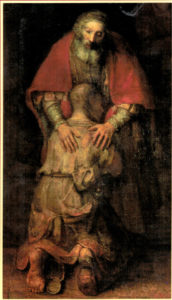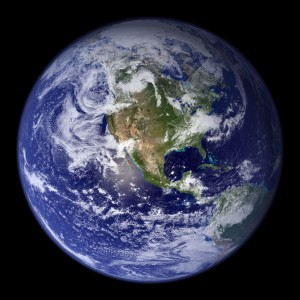The Prodigal Son and the Great Turning
Our text this morning, the Fourth Sunday in Lent, is from the Gospel of Luke. It’s one of the best-known and best-loved parables that Jesus ever told. People often call this story the Parable of the Prodigal Son, but that title isn’t quite accurate, since the parable is really about two sons and their loving father. Still, it is the prodigal son, the younger one, that I’d like to focus on this morning, because as we think about our relationship with the natural world, both as individuals and collectively, as a species, it may be just the story that we need to hear.
The story begins: “There was a man who had two sons” (Luke 15:11). For reasons we don’t know, the younger son decides to go it alone. He’s outta there, itching to leave, ready to hit the road and do things his own way. He asks his father to give him his portion of his inheritance in advance – quite a presumptuous and irregular thing to do in that culture – and off he goes, money in hand, to what the story calls “a distant country” (Luke 15:13). There, he squanders it all in “dissolute living.” After spending every last dime, he is caught up in “a severe famine” that has spread across the country, and he begins “to be in need” (Luke 15:14). What can he do? He hires himself out in a job considered shameful in Jewish culture: he feeds pigs, which are unclean animals according to Jewish law. Humiliated and close to starving, he wishes desperately that he could eat the very pods or corncobs that the pigs eat. This part of the story ends with the awful words that ring like a death sentence: “No one gave him anything” (Luke 15:16).
 What would it look like if humanity “came to ourselves”? Maybe it would look something like this: one individual after another saying, “Hey, wait a second. We don’t have to live like this. We don’t have to settle for a death-dealing, materialistic society that willy-nilly gobbles up all the land and trees and creatures of this world, extracts and burns dirty fossil fuels, pours toxic pollutants into the water and air, and stuffs the landfill with plastics and waste. We don’t have to settle for a suicidal course that steals a habitable world from our children. Through the grace of God we can make changes in our own lives, so that we live more gently and lovingly on the Earth, and we can resist and protest the powers-that-be that are determined to make huge profits by treating people and planet alike as completely disposable, extracting every last drop of oil and gas and every last ounce of coal, and cutting down every last tree.” We can say to ourselves, “I’m going to turn my own life around and make the changes I can make, and I’m also going to stand with all the people of the world who want what I want – a society marked by generosity, not greed; by justice, not prejudice and inequity; by love, and not indifference and hate.” Like the prodigal son, we can say to ourselves “I will get up and go to my father” (Luke 15:18) and begin the journey home.
If you’d like to discuss the specific things we can do as we make that journey, and talk about everything from electric cars to the Green New Deal, I hope you’ll meet with me after the service.
You know, the journey we’re undertaking will not be an easy one, for the challenges ahead of us are great and the corporate and political powers arrayed against us are strong. The IPCCC tells us that in order to avert climate chaos and the possible collapse of civilization, humanity has to change course at a scale and speed that is unprecedented in human history. So, yeah, as we rise up to fight for a better world, sometimes we’ll find ourselves wrestling with feelings of helplessness, grief, and even despair. I’m so interested in what gives us strength and energy to keep going that I just finished co-editing a book of essays with my friend Leah Schade, which will be published this fall. It’s entitled Rooted and Rising: Voices of Courage in a Time of Climate Crisis, and it’s a collection of essays by 21 faith-based climate activists, reflecting on the spiritual practices that sustain us.
I can think of no more beautiful way to spend ones life than to take part in what leaders like Joanna Macy and David C. Korten call the Great Turning, the epic transition from a deathly society to one that fosters life. It’s what philosopher Thomas Berry calls the “Great Work”: our wholehearted effort to create a more just and sustainable society. And it’s what Archbishop Desmond Tutu calls the “supreme work” of Jesus Christ, who longs to reconcile us to God and to each other and to the whole of God’s Creation.2
You know, God loves it when we come home. God gets happy when we who are lost are willing to be found. That’s what Jesus shows us in the next part of the parable: the father, who has evidently been waiting eagerly for his son’s return, catches sight of him while he is “still far off” and, “filled with compassion” (Luke 15:20), runs out to greet him and catches him up in his arms in an exuberant embrace.
The story of the prodigal son is a grand story about reunion, about being lost and being found, about forgiveness and reconciliation. May it be our story, too, as we come home to ourselves and turn our lives toward loving God and all our neighbors, including our brother-sister beings and the Earth upon which all life depends.
What would it look like if humanity “came to ourselves”? Maybe it would look something like this: one individual after another saying, “Hey, wait a second. We don’t have to live like this. We don’t have to settle for a death-dealing, materialistic society that willy-nilly gobbles up all the land and trees and creatures of this world, extracts and burns dirty fossil fuels, pours toxic pollutants into the water and air, and stuffs the landfill with plastics and waste. We don’t have to settle for a suicidal course that steals a habitable world from our children. Through the grace of God we can make changes in our own lives, so that we live more gently and lovingly on the Earth, and we can resist and protest the powers-that-be that are determined to make huge profits by treating people and planet alike as completely disposable, extracting every last drop of oil and gas and every last ounce of coal, and cutting down every last tree.” We can say to ourselves, “I’m going to turn my own life around and make the changes I can make, and I’m also going to stand with all the people of the world who want what I want – a society marked by generosity, not greed; by justice, not prejudice and inequity; by love, and not indifference and hate.” Like the prodigal son, we can say to ourselves “I will get up and go to my father” (Luke 15:18) and begin the journey home.
If you’d like to discuss the specific things we can do as we make that journey, and talk about everything from electric cars to the Green New Deal, I hope you’ll meet with me after the service.
You know, the journey we’re undertaking will not be an easy one, for the challenges ahead of us are great and the corporate and political powers arrayed against us are strong. The IPCCC tells us that in order to avert climate chaos and the possible collapse of civilization, humanity has to change course at a scale and speed that is unprecedented in human history. So, yeah, as we rise up to fight for a better world, sometimes we’ll find ourselves wrestling with feelings of helplessness, grief, and even despair. I’m so interested in what gives us strength and energy to keep going that I just finished co-editing a book of essays with my friend Leah Schade, which will be published this fall. It’s entitled Rooted and Rising: Voices of Courage in a Time of Climate Crisis, and it’s a collection of essays by 21 faith-based climate activists, reflecting on the spiritual practices that sustain us.
I can think of no more beautiful way to spend ones life than to take part in what leaders like Joanna Macy and David C. Korten call the Great Turning, the epic transition from a deathly society to one that fosters life. It’s what philosopher Thomas Berry calls the “Great Work”: our wholehearted effort to create a more just and sustainable society. And it’s what Archbishop Desmond Tutu calls the “supreme work” of Jesus Christ, who longs to reconcile us to God and to each other and to the whole of God’s Creation.2
You know, God loves it when we come home. God gets happy when we who are lost are willing to be found. That’s what Jesus shows us in the next part of the parable: the father, who has evidently been waiting eagerly for his son’s return, catches sight of him while he is “still far off” and, “filled with compassion” (Luke 15:20), runs out to greet him and catches him up in his arms in an exuberant embrace.
The story of the prodigal son is a grand story about reunion, about being lost and being found, about forgiveness and reconciliation. May it be our story, too, as we come home to ourselves and turn our lives toward loving God and all our neighbors, including our brother-sister beings and the Earth upon which all life depends.
1. The Book of Common Prayer (The Seabury Press, 1979), 450. 2. Archbishop Desmond Tutu, Foreword, The Green Bible, New Revised Standard Version (New York: HarperOne, HarperCollins, 2008), I-14
